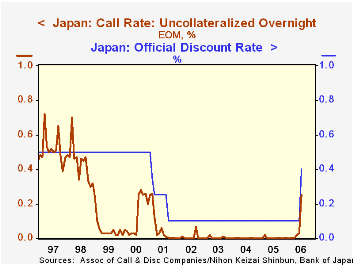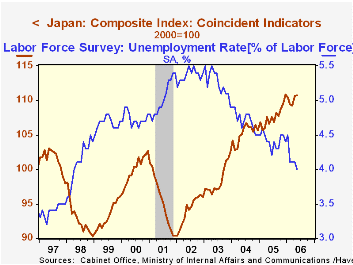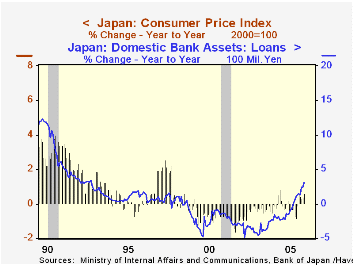 Global| Jul 14 2006
Global| Jul 14 2006Bank of Japan Raises Key Interest Rates
Summary
The Bank of Japan announced a policy change today (Friday). The best way to describe it is to quote the Bank's own text:"At the Monetary Policy Meeting held today, the Bank of Japan decided, by a unanimous vote, to change the [...]

The Bank of Japan announced a policy change today (Friday). The best way to describe it is to quote the Bank's own text:"At the Monetary Policy Meeting held today, the Bank of Japan decided, by a unanimous vote, to change the guideline for money market operations for the intermeeting period, effective immediately from the announcement of the decision. "The Bank of Japan will encourage the uncollateralized overnight call rate to remain at around 0.25 percent." This reflects basically a 25-basis-point increase in that key money market interest rate. The Bank also raised its discount rate from 0.1% to 0.4%. This rate covers bank borrowing directly from the Bank of Japan under its lending facility; at the same time, waivers of extra fees -- "add-on rates" -- will continue for frequent users of the facility, so the Bank is not trying to discourage its use. The Bank will also continue buying long-term Japanese government bonds in an attempt to restrain any general rise in long-term interest rates.
This is the first increase in the BoJ's basic rate structure since July 2000, when the call rate was also raised from near zero to 0.25%. The strength of the Japanese economy was fairly tenuous then, though, and this hike was reversed in March 2001. Now, in contrast, the BoJ believes that "Japan's economy continues to expand moderately, with domestic and external demand and also the corporate and household sectors well in balance. The economy is likely to expand for a sustained period." Moreover, "the year-on-year rate of change in consumer prices is projected to continue to follow a positive trend."
The Bank remains somewhat skeptical, however, and concludes its announcement with the assessment that it expects to "adjust the level of the policy interest rate gradually . . . In this process, an accommodative monetary environment ensuing from very low interest rates will probably be maintained for some time."
The moderate language of the statement and the implication that further rate increases would come only slowly was milder than some market participants were anticipating, apparently, and they actually traded the yen downward on the day. The stock market fell as well, but this may be related to declines in other world markets that are in response to the violence in the Middle East and the accompanying pressure on oil prices.
We'd probably agree with the BoJ, though, in their cautious attitude. Just on Tuesday, Louise Curley discussed "wavering" consumer sentiment in the country and on June 30, we expressed some discomfort of our own with evident hesitation in labor markets. These caveats notwithstanding, the Japanese economy is in the best condition it has seen in a good many years. The second graph here illustrates this with the Cabinet Office's index of coincident indicators and the unemployment rate. Two other conditions have changed over the past several months. Bank lending has begun to grow again. In the third graph, we see the nice uptrend developing in loans at domestic banks. At the time of the last BoJ rate hike in 2000, the banks were still under pressure from distressed loans and their loan portfolios were contracting, a process that continued until June of last year. Additionally, prices are rising, with positive year-on-year changes in the CPI now for five consecutive months. As Louise noted in her discussion Tuesday, people are now concerned that there might be more inflation than they want!
Carol Stone, CBE
AuthorMore in Author Profile »Carol Stone, CBE came to Haver Analytics in 2003 following more than 35 years as a financial market economist at major Wall Street financial institutions, most especially Merrill Lynch and Nomura Securities. She had broad experience in analysis and forecasting of flow-of-funds accounts, the federal budget and Federal Reserve operations. At Nomura Securities, among other duties, she developed various indicator forecasting tools and edited a daily global publication produced in London and New York for readers in Tokyo. At Haver Analytics, Carol was a member of the Research Department, aiding database managers with research and documentation efforts, as well as posting commentary on select economic reports. In addition, she conducted Ways-of-the-World, a blog on economic issues for an Episcopal-Church-affiliated website, The Geranium Farm. During her career, Carol served as an officer of the Money Marketeers and the Downtown Economists Club. She had a PhD from NYU's Stern School of Business. She lived in Brooklyn, New York, and had a weekend home on Long Island.
More Economy in Brief
 Global| Feb 05 2026
Global| Feb 05 2026Charts of the Week: Balanced Policy, Resilient Data and AI Narratives
by:Andrew Cates





